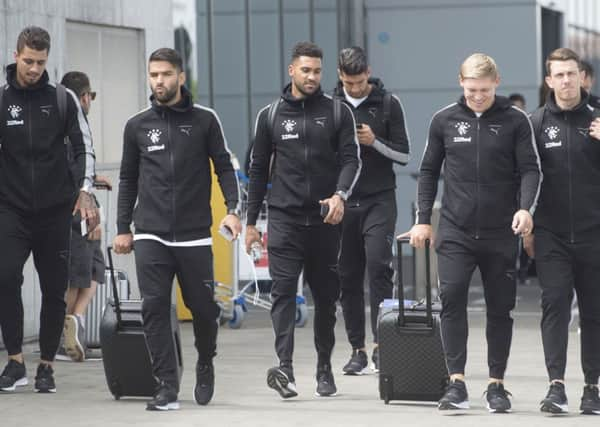Five things we learned from Progres Niederkorn 2 - 0 Rangers
This article contains affiliate links. We may earn a small commission on items purchased through this article, but that does not affect our editorial judgement.


The Banter Years live on
When Rangers announced a new retail deal with Sports Direct, giving the club some much-needed funding boost after a summer spending spree, a few (including this writer) did wonder if Rangers: The Banter Years was coming to a conclusion.
Advertisement
Hide AdAdvertisement
Hide AdIt’s been a term widely adopted on social media by both critics of the club and its own supporters, who’ve taken to repeating it in an attempt to inject some levity while they try to make sense of recent hardships. Unfortunately for them, it doesn’t look like it’s going to be retired any time soon.
Last night’s result was shocking, but not all that surprising. Getting beaten by a part-time side from Luxembourg who’d only scored once in 13 European games may seem crazy, but when it comes to Rangers we’ve all learned to expect the unexpected.
There was a fatal flaw in Caixinha’s plan
Even the worst of tactics would have got the job done on Tuesday night had the players went about their business with any sort of energy or urgency. However, it doesn’t excuse the fact that Rangers were pretty one-dimensional in their plan of attack.
The strategy throughout the match seemed to involve getting Lee Wallace or James Tavernier pushed high up the park, allowing the wide forwards to drift inside and support lone central striker Alfredo Morelos. The full-backs would be found by ranging passes from Niko Kranjcar, Jordan Rossiter or Ryan Jack. They successfully did this enough to create opportunities in the wide areas, only for the cross to let them down time and again. Wallace, in particular, really struggled to find a team-mate with his deliveries from wide areas.
Instead of looking to change things up, Caixinha waited until Rangers were 2-0 behind to introduce a second striker into the fray. It wasn’t just the players who were sluggish.
Three man midfield had no penetration
Another issue with the gameplan was the lack of penetration from the central midfield three. Having Jack and Rossiter at the base of the triangle was a classic example of using two players who, pretty much, carry out the same job. Both are good at keeping possession and moving the play forward, but neither is much of a threat running from deep and both are undersized for the position, which contributed to Rangers getting bullied in the middle as the match wore on.
Kranjcar, meanwhile, was stationed in the No.10 role. Typically, this involves supporting the striker, but instead the Croat would drop deep alongside Jack and Rossiter and perform a quarterback impression. The veteran was the only player who looked capable of creating something, but it meant Rangers had no one from the centre of midfield capable of getting beyond the striker and giving the Niederkorn defence something else to think about.
The set piece problems continue
One of many weaknesses Rangers suffered from last season was the inability to defend set-pieces, and so far it doesn’t look like that’s going to change this campaign.
Advertisement
Hide AdAdvertisement
Hide AdBoth goals from Tuesday night’s defeat stemmed from a set-piece. Olivier Thill, perhaps the hosts’ best player on the night, set up the first after picking up a partially cleared ball following a corner on the right. Ten minutes later, Niederkorn put themselves in front in the tie when Sébastien Thill (Olivier’s brother) swung in a free-kick that evaded everyone and dropped in at the back post.
What’s more, when Rangers lost possession they were often left short in defence. The full-backs were pushed up high with no one covering, allowing Niederkorn space to operate when they broke forward. It was one of many issues symptomatic of the Mark Warburton era, and it’s yet to be addressed by Caixinha.
Treating European games as friendlies is costing Scottish clubs
The use of a deep central midfield meant there was a responsibility of the front three to link with each other in order to give another avenue of attack. Unfortunately for the visitors, Morelos, Kenny Miller and Daniel Candeias looked like perfect strangers. The trio were not on the same wavelength at all.
An understanding between three footballers who’ve never played together will develop over time. Even if Rangers continue to struggle under Pedro Caixinha, they would still be expected to win that game 99 times out of 100 if it occurs a couple of months down the line.
The club made the classic mistake which is being repeated all too often by Scottish clubs, which is the decision to treat European ties as part of the pre-season.
How to solve this is a different matter. Summer football is often mooted, but completely changing the league schedule is not like flicking on a light switch. There are numerous obstacles to navigate around and most clubs don’t even want it. An earlier end to the season, giving teams more time to prepare, could possibly be an answer, though it may then become difficult to find suitable opponents for friendlies as several other top nations would just be starting their rest period. The same goes for signings, with many pre-contract deals unable to be registered before 30 June.
Or our teams could stop treating these sorts of games like glorified walkabouts and approach them with the professionalism they would if they were facing a European giant. Perhaps this is the wake-up call to end all wake-up calls.
